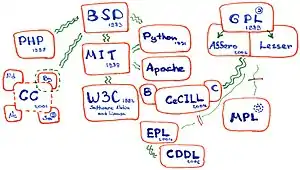Free license
A free license or open license[1][2] is a license agreement which contains provisions that allow other individuals to reuse another creator's work, giving them four major freedoms. Without a special license, these uses are normally prohibited by copyright law or commercial license. Most free licenses are worldwide, royalty-free, non-exclusive, and perpetual (see copyright durations). Free licenses are often the basis of crowdsourcing and crowdfunding projects.
The invention of the term "free license" and the focus on the rights of users were connected to the sharing traditions of the hacker culture of the 1970s public domain software ecosystem, the social and political free software movement (since 1980) and the open source movement (since the 1990s).[3] These rights were codified by different groups and organizations for different domains in Free Software Definition, Open Source Definition, Debian Free Software Guidelines, Definition of Free Cultural Works and The Open Definition.[1] These definitions were then transformed into licenses, using the copyright as legal mechanism. Since then, ideas of free/open licenses spread into different spheres of society.
Open source, free culture (unified as free and open-source movement), anticopyright, Wikimedia Foundation projects, public domain advocacy groups and pirate parties are connected with free and open licenses.
Philosophy
Classification and licenses

By freedom
- Agreement, which is related to the public domain
- Creative Commons CC0
- WTFPL
- Unlicense
- Public Domain Dedication and License (PDDL)[4]
- Permissive licenses
- BSD License
- MIT License
- Mozilla Public License (file-based permissive copyleft)
- Creative Commons Attribution
- Copyleft licenses
- GNU GPL, LGPL (weaker copyleft), AGPL (stronger copyleft)
- Creative Commons Attribution Share-Alike
- Mozilla Public License
- Common Development and Distribution License
- GFDL (without invariant sections)
- Free Art License
By type of content
By authors
- Free Software Foundation
- Open Source Initiative
- Creative Commons
- Microsoft
- Open Content Project
- Open Data Commons from Open Knowledge Foundation
- Public Domain Dedication and License (PDDL)
- Attribution License (ODC-By)
- Open Database License (ODC-ODbL)
Problems
- License compatibility
- License proliferation
- Permissive free software Commons has affiliates in more than 100 jurisdictions all over the world.
European Union
EUPL was created in the European Union.
Germany
Harald Welte created gpl-violations.org
References
- Open Definition 2.1 on opendefinition.org "This essential meaning matches that of “open” with respect to software as in the Open Source Definition and is synonymous with “free” or “libre” as in the Free Software Definition and Definition of Free Cultural Works."
- The Open Source Definition
- Kelty, Christpher M. (2018). "The Cultural Significance of free Software - Two Bits" (PDF). Duke University press - durham and london. p. 99.
Prior to 1998, Free Software referred either to the Free Software Foundation (and the watchful, micromanaging eye of Stallman) or to one of thousands of different commercial, avocational, or university-research projects, processes, licenses, and ideologies that had a variety of names: sourceware, freeware, shareware, open software, public domain software, and so on. The term Open Source, by contrast, sought to encompass them all in one movement.
- PDDL 1.0 on opendatacommons.org
